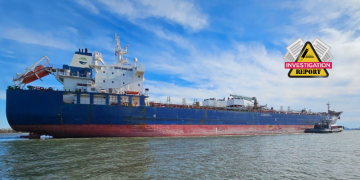Munich Re has released its “Marine Trend Radar 2025” whitepaper, exploring the key trends shaping the maritime and logistics landscape in 2025, such as geopolitical fragmentation, inclusive talent culture, and alternative fuels.
According to Munich Re, the past year has underscored the urgency of navigating an increasingly volatile world. The maritime and logistics industry continues to adapt to dynamic global forces, including rising geopolitical uncertainty, which now affects global trade routes, supply chains, and the broader economic landscape.
Alongside these challenges, the global temperature from February 2024 to January 2025 reached record levels once again, highlighting the intensifying impacts of climate change.
Furthermore, these realities coincide with significant positive and negative milestones, such as the integration of maritime emissions into global decarbonisation frameworks and the continued rise in conflict rates worldwide, impacting nearly 20% of the global population.
Geopolitical fragmentation
The Red Sea/Suez Canal waterway, vital for global trade with around 30% of container traffic passing through, has become increasingly vulnerable due to attacks. Starting with the hijacking of the cargo vessel Galaxy Leader by Houthi forces on November 19, 2023, there have been 164 events and 136 attacks by December 12, 2024. While these attacks affect a small portion of traffic, they discourage transits, with the Portwatch database reporting a drop in Suez Canal transits from 52 ships in 2024 to just 23 on January 5, 2025.
The Taiwan Strait, a key passage for about a third of global cargo, also holds significant economic risk. Disruptions here could reduce global economic output by up to 2.8% annually and heavily impact the technology sector, as Taiwan produces 60% of global semiconductors.
Geopolitical fragmentation, exemplified by the US-China trade conflict, further exacerbates global trade instability. Tariffs imposed by both nations have contributed to the decline of US manufacturing jobs and heightened tensions, with additional tariffs introduced in February 2025.
Lastly, global sanctions on Russia, due to its invasion of Ukraine, have spiked energy and food inflation, weakened currencies in import-dependent countries, and driven up living costs. Many nations are now seeking to reduce reliance on Russian energy supplies.
Ageing infrastructure
Maritime infrastructure is crucial, with over 80% of global trade transported by sea, directly impacting supply chains, energy, and food security. However, aging infrastructure poses significant risks, as seen in the collapse of Baltimore’s 47-year-old Francis Scott Key Bridge in March 2024. The bridge, struck by a large container ship, caused six fatalities and disrupted shipping in and out of the Port of Baltimore for 11 weeks, costing billions.
This incident underscores concerns about infrastructure resilience, particularly the outdated safety measures that failed to account for modern ships.
In the U.S., nearly half of the nation’s bridges are over 50 years old, and similar issues affect levees and dams. Aging infrastructure faces not only structural wear but also maintenance challenges due to outdated construction methods and lengthy replacement processes caused by funding, licensing, and capacity issues.
Inclusive talent culture
The maritime industry faces challenges due to its global nature, demanding working conditions, and historical workforce demographics. With diverse talent underrepresented, only 22% of the global workforce in oil and gas are women, and a similar percentage are racial and ethnic minorities. This disparity highlights the need for comprehensive data to understand the full scope of underrepresentation in the maritime sector.
Like many male-dominated industries, the maritime sector has been slow to implement inclusive initiatives. This delay risks hindering the industry’s ability to attract and retain top talent. Growing pressure from stakeholders, including investors, customers, and employees, is driving companies to adopt social responsibility commitments.
In response, governments are introducing regulations to address gender pay gaps, diversity reporting, and other related metrics.

Most important changes from 2024 to 2025, according to Munich Re:
- Offshore wind energy: This trend has experienced a rapid surge in deployment in the past year, and 2024 was identified as a “turning point year” for growth in the sector.
- Car carrier fire safety: In 2025, the spotlight has shifted specifically to car carrier fire safety with a gaining momentum and high impact calling for better training, new technologies and smooth transformation of regulation.
- Alternative fuels: In 2025, this trend has gained significant momentum and now carries a high impact, driven by three pivotal developments: regulatory momentum, accelerating technological advancement, investment appetite.





























































